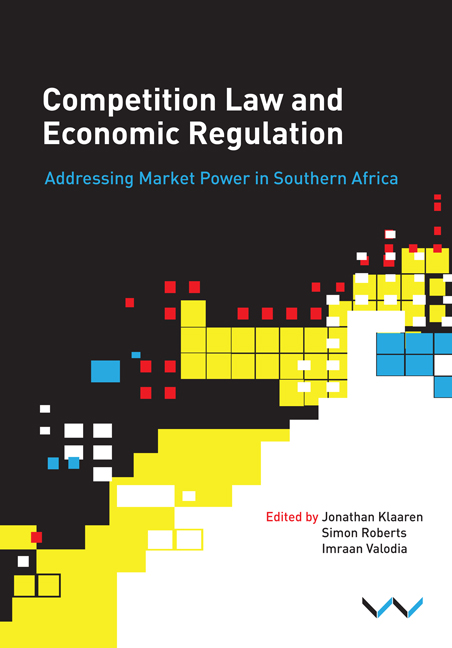 Competition Law and Economic Regulation in Southern Africa
Competition Law and Economic Regulation in Southern Africa Book contents
- Frontmatter
- Contents
- Tables, figures and boxes
- Acknowledgements
- Acronyms and abbreviations
- Introduction: The development of competition and regulation in southern Africa
- Part One Cartel law enforcement
- Part Two Issues in competition and regulation
- Part Three Competition and regulation in reshaping African markets
- Part Four Conclusion
- 11 Competition, regional integration and inclusive growth in Africa: A research agenda
- Contributors
- Index
11 - Competition, regional integration and inclusive growth in Africa: A research agenda
from Part Four - Conclusion
Published online by Cambridge University Press: 23 March 2018
- Frontmatter
- Contents
- Tables, figures and boxes
- Acknowledgements
- Acronyms and abbreviations
- Introduction: The development of competition and regulation in southern Africa
- Part One Cartel law enforcement
- Part Two Issues in competition and regulation
- Part Three Competition and regulation in reshaping African markets
- Part Four Conclusion
- 11 Competition, regional integration and inclusive growth in Africa: A research agenda
- Contributors
- Index
Summary
REGIONAL INTEGRATION AND INCLUSIVE GROWTH: DOES COMPETITION MATTER?
In recent years there has been increased attention, once more, on regional integration and its potential contribution to African economic development. However, there are very different emphases and perspectives. On the one hand, regional integration is essentially viewed as removing tariff and non-tariff barriers to trade; in essence, a second-best to unilateral liberalisation. It is also advocated as part of ‘defragmenting Africa’ – overcoming the legacy of colonial borders – adding the reduction (or even removal) of border controls to the agenda of tariff liberalisation. Other perspectives emphasise the constructive measures required for more meaningful and deeper integration, ranging from investments in improved transport infrastructure to developing effective institutional arrangements. This can include provisions for collaboration on a regional industrial policy, to build capabilities and regional value chains.
A key aspect in the different perspectives is the extent to which natural markets and the behaviour of firms are understood as regional in scope. As firms are internationalised – including through ownership relations, strategic partnerships and distribution arrangements – a regional perspective to firm decision making, such as regarding investment and location of production, is necessary. Given scale economies and relatively small national markets, firms make decisions across countries. However, when trade barriers are raised, firms can protect their market power within countries, which would otherwise be undermined by competition at a regional level.
It is evident that the market power of large firms, whether exerted unilaterally or through coordination with each other, harms economic development and low-income groups. Such power means higher prices for goods and services and distorts the development path of economies where it relates to the pricing of important inputs (such as the effect of fertiliser costs on farmers). The nature of competitive rivalry, and the power and interests of large firms and their owners, is thus at the heart of how countries develop (see Acemoglu and Robinson, 2012; North, Wallis and Weingast, 2009). The decisions of large firms shape the economy as they can make the investments required in productive capacity, provide the upstream inputs and services required by smaller businesses and, in many areas, are also the main routes to market. In crude terms, it is critical whether these firms extract rents through market power, or whether the returns reward effort, creativity and entrepreneurship.
- Type
- Chapter
- Information
- Competition Law and Economic Regulation in Southern AfricaAddressing Market Power in Southern Africa, pp. 263 - 287Publisher: Wits University PressPrint publication year: 2017
